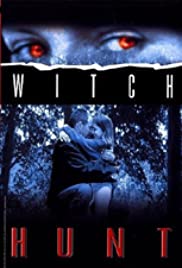
WITCH HUNT
Australia, 1999, 90 minutes, Colour.
Jacqueline Bissett, Cameron Daddo, Jerome Ehlers, Suzi Doherty, William Gleuth, Alexandra Schepisi, Gerald Lepkowski.
Directed by Scott Hartford Davis.
Witch Hunt is based on actual characters and events in the state of Victoria. They have been altered – and the film-makers acknowledge that this is a speculation on the events and what could have been.
The film focuses on the abduction of a young girl. Her grandparents (Jacqueline Bisset and William Gleuth) blame her father who has been divorced from their dead daughter and has partial custody of the child (Cameron Daddo).
Jerome Ehlers and Suzi Doherty are the police. There is a thorough investigation, trying to find clues. The father is desperate and blames the grandparents, eventually accusing the grandmother of being a witch. He is continually desperate and it is credible that he has taken his own child. Jacqueline Bissett is smooth and strong as the grandmother, dominating the rest of the family, her husband and her son and antagonistic towards the father of her daughter? She laughs at the accusations of being a witch.
However, as the film progresses it emerges that she has an interest in the occult, that she has written books, that she is a witch and wants to pass down the powers to the next generation, but with her daughter dead she has to do it with her grandchild whom she has abducted.
Eventually the case is complete, the grandmother had urged her son to hire an assassin to kill the father – but he had hired an undercover policeman.
The film is melodramatic – but, with suggestions from the actual case, it makes a plausible enough study of the situation of abduction, domestic violence, and the possibility of witchcraft.
1.An entertaining thriller? True story? Family relationships? The background of witchcraft? Contemporary police work?
2.The Australian setting, the Victorian countryside, the town, the homes? The open fields? The city of Melbourne? Musical score?
3.The title, the reference to Barbara, her work, her associates? The witch hunt against David?
4.The situation: the disappearance of the little girl, the sequence of her disappearing? Her father’s reaction, love for his daughter, the relationship with her mother, her mother being dead, his wanting custody? Barbara and Ray, their custody of the child, their relationship with their daughter, hostility towards David?
5.The portrait of David, erratic, emotional? Work? Marriage, his in-laws and their dislike? His love for his daughter? Her love for him? The flashbacks, his friends, Barbara, the family, his wife, moving away from him, their clashes, her death? His being by himself, the desperate search? The fact that he was a target for assassination? His final vindication? The complexity of his character, the experience, fathers discriminated against?
6.Barbara, her calm, age, experience? Her domination of her husband? Domination of her daughter? Watching over the child? The information about witchcraft, her friend, the books? Her antagonism towards David? Interrogations by the police? Working behind the scenes, the abduction, the contract for David, asking her son to arrange it? The gradual revelation of the truth, trying to recover the child? The witchcraft, the handing on of powers? Her dead daughter, her granddaughter being the potential witch? The credibility of this kind of woman being a witch?
7.The strong presentation of the police, Jack and Jenny, their work, thoroughness, investigations, interrogations? Suspicions? Their discussions with David, Barbara and her treatment? The eventual arrest?
8.The assassin, the son and his dislike of David, obeying his mother? The arrangement – and the irony that he was an undercover policeman?
9.The portrait of the town, the friends of the Thomas family, the shopkeepers? Perfectly ordinary? A setting for this kind of witchcraft story, abduction?